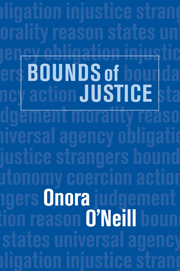Book contents
- Frontmatter
- Contents
- Preface
- Introduction
- Part I Philosophical Bounds of Justice
- 1 Four models of practical reasoning
- 2 Agency and autonomy
- 3 Principles, practical judgement and institutions
- 4 Kant's justice and Kantian justice
- 5 Which are the offers you can't refuse?
- 6 Women's rights: whose obligations?
- Part II Political bounds of justice
- Bibliography
- Index
2 - Agency and autonomy
Published online by Cambridge University Press: 02 December 2009
- Frontmatter
- Contents
- Preface
- Introduction
- Part I Philosophical Bounds of Justice
- 1 Four models of practical reasoning
- 2 Agency and autonomy
- 3 Principles, practical judgement and institutions
- 4 Kant's justice and Kantian justice
- 5 Which are the offers you can't refuse?
- 6 Women's rights: whose obligations?
- Part II Political bounds of justice
- Bibliography
- Index
Summary
Reasoning about action is for agents: if there are no agents, there will be no useful practical reasoning, let alone reasoning about justice. Work in political philosophy and ethics often takes it that a central feature of agents is that they can be, are, or at least should be autonomous; yet there is a spectacular amount of disagreement both about what autonomy is and about its moral significance. Writers on autonomy usually claim that it is either some form of independence in acts and agents or some form of coherence or rationality in acts and agents: this division runs deep.
Those who depict autonomy as some sort of independence tend to think of it as relational and graduated: independence is from something or other and may be more or less complete. Autonomy is seen as a hard-won and (usually) desirable psychological trait that may be manifested, for example, in independence of judgement, inner-directedness, selfcontrol, adherence to principle and self-sufficiency.
Those who depict autonomy as some sort of coherence or rationality usually think that it is not relational, and not graduated. Sometimes they view autonomy, or at least the capacity for autonomy, as an inherent feature of all human beings, even as the basis of human worth or dignity, and not as something which the more self-sufficient or successful or independent have developed to greater degree than the rest of us, or that could be confined to one area of life.
Many versions of these and similar views of autonomy can be found.
- Type
- Chapter
- Information
- Bounds of Justice , pp. 29 - 49Publisher: Cambridge University PressPrint publication year: 2000



